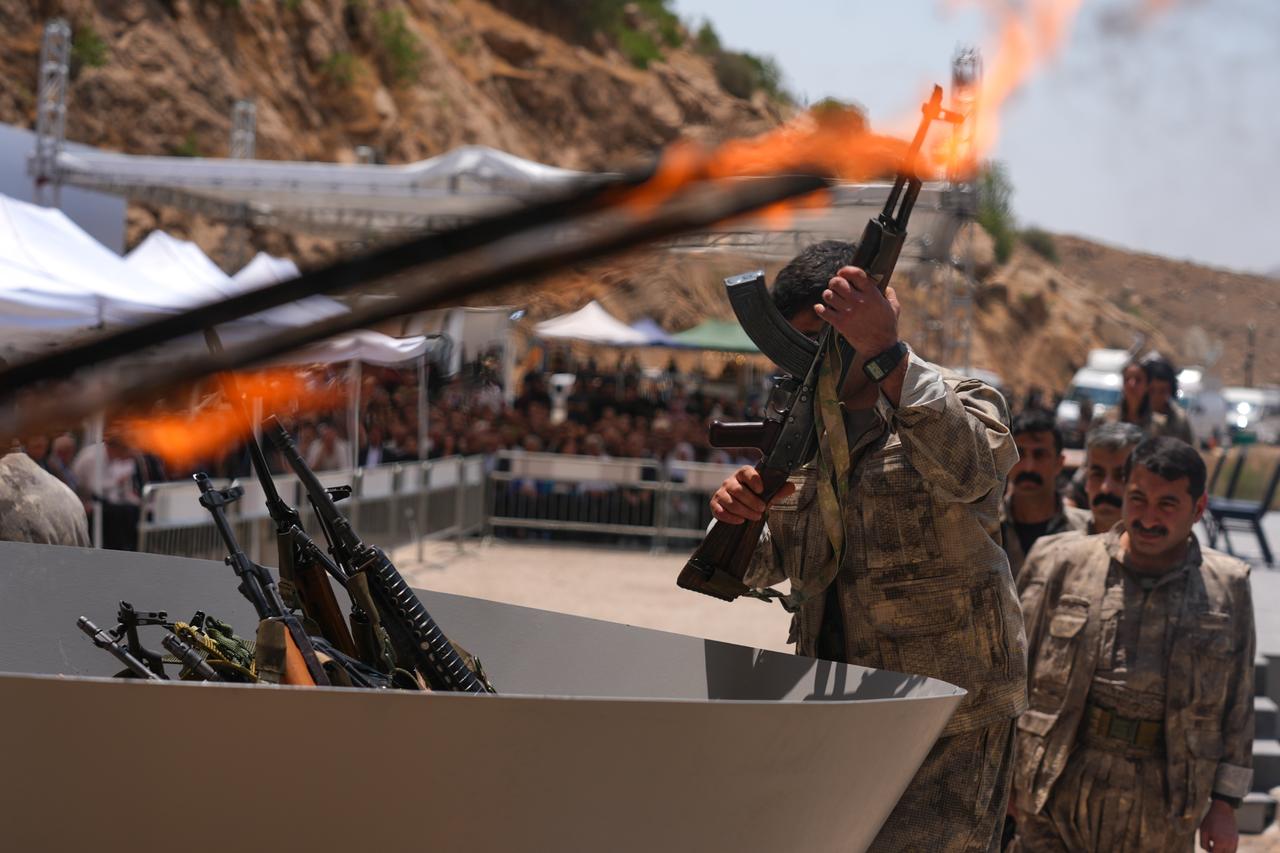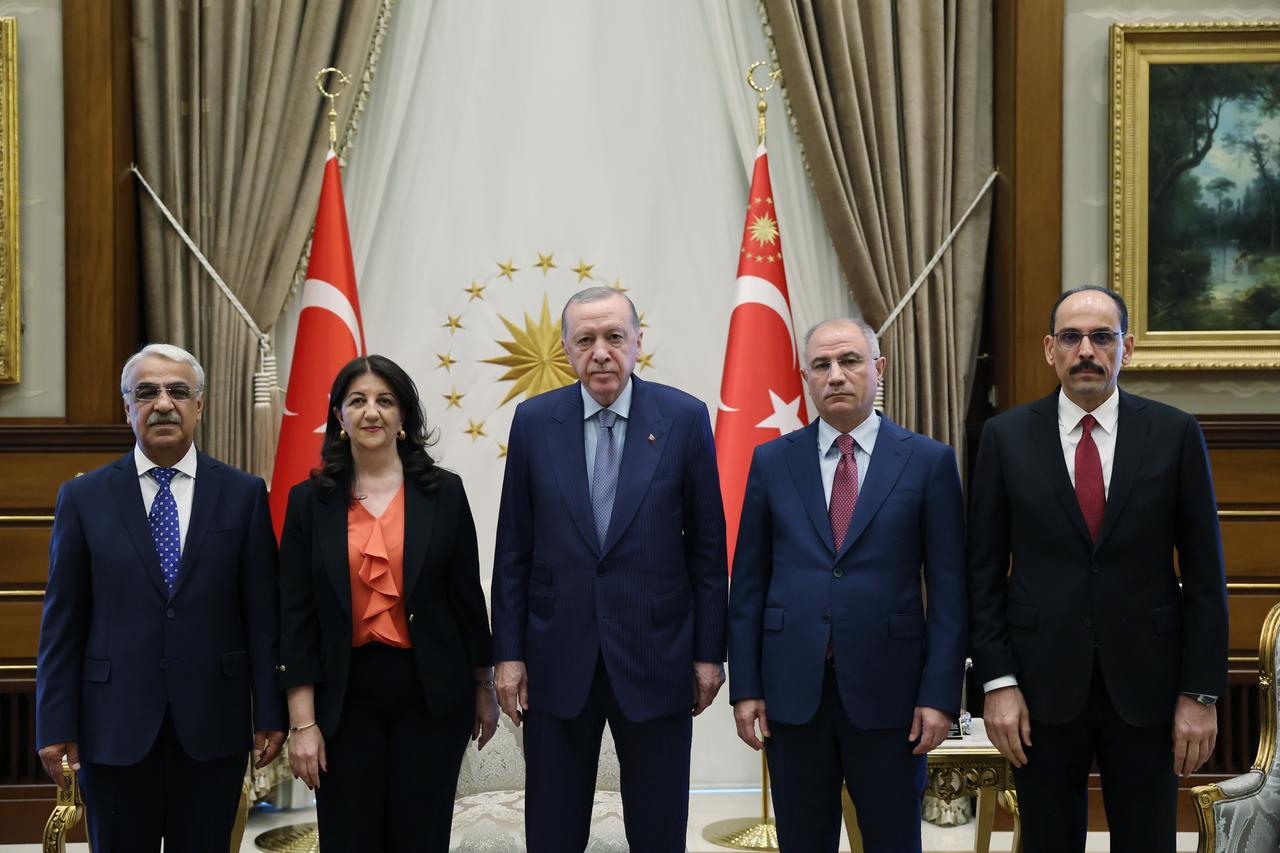
On Friday, in a landmark event that may redefine Türkiye’s political landscape, the PKK terrorist group initiated disarmament during a symbolic ceremony held in Sulaymaniyah.
This move made the country progress one step closer to ending more than four decades of armed struggle that has resulted in tens of thousands of deaths and displaced millions. The disarmament represents not only a break from the violent past but also the opening of a new chapter with potential for political transformation.
The conflict between the Turkish state and the PKK has long shaped Türkiye’s political discourse, societal divisions, and security policies. The cessation of its armed activities could recalibrate political dynamics, deeply impacting institutions, parties, and public opinion that have been deeply scarred by years of hostility, such as the rise of new parties, constitutional reform, and government-opposition relations.
The disarmament is expected to shift power balances within Türkiye’s political arena. Central to this shift is the Kurdish-oriented Peoples' Equality and Democracy Party (DEM Party), which is anticipated to gain increased political legitimacy and space to operate.
Analysts like Seren Selvin Korkmaz, director of IstanPol Institute, suggest the party may even undergo rebranding, possibly changing its name to signal a new direction aligned with the peace process.
However, the evolving political environment affects more than just DEM. Both ruling and opposition parties will need to navigate a reshaped political field. The ruling party faces the challenge of consolidating power amid these changes, while opposition parties, notably the Republican People's Party (CHP), encounter intensifying pressure and internal fights, as seen in recent crackdowns.

Following the initial disarmament actions, the Turkish Parliament is expected to establish a new commission tasked with providing a legal framework for the process. This body will likely address key demands linked to the peace efforts, such as granting formal legal guarantees to secure the disarmament and reintegration process.
The legislation is expected to focus on reintegrating former members of terrorist groups who have not committed crimes beyond joining the organization. It will apply to individuals both within Türkiye and abroad, aiming to support their return to civilian life.
Adjustments to the Penal Execution Law may be proposed, potentially impacting the status of detainees convicted on terrorism-related charges by offering sentence reductions or provisions for early release contingent on new political agreements.
One of the most sensitive and politically charged issues is the possible release of political prisoners associated with the terrorist movement. High-profile DEM Party figures such as former co-chairs Selahattin Demirtas and Figen Yuksekdag are reportedly subjects of ongoing discussions. While it remains uncertain if their release will be formally tied to the disarmament process, any such move would carry profound political significance.
Alongside these developments, there is anticipation of a renewed debate over constitutional reform. Such a debate might begin with symbolic changes, for instance, revising the legal definition of citizenship, but it could also usher in deeper transformations affecting political alliances, electoral rules, and ideological configurations across Türkiye.
Beyond the immediate political calculations, Galip Dalay, senior fellow at Chatham House, sees the end of PKK armed activity as a chance to reframe how Türkiye defines itself—internally and externally.
“This process will once again lead to the re-imagination of Turkish citizenship, the idea of Turkish nationhood and Turkish geopolitical identity,” Dalay said.
According to Dalay, Türkiye’s perception of Kurds—as well as its broader threat assessments—has already evolved, and this process may accelerate that shift:
“Let’s not forget not long ago the Kurdistan Regional Government in Iraq was also perceived through the threat perception in Türkiye. But now it has turned into one of the closest allies of Türkiye.”
David L. Phillips, director of the Program on Peace-building and Rights at Columbia University, draws on experiences from other post-conflict settings, noting: "You start with the technical tasks such as disarmament. Then you need to have a broader program of reintegration that includes economic development and reintegrating fighters into the society as a whole.” He also urges that technical side and reintegration “are different baskets that have to work together in order to achieve a greater goal.”
Over the past several years, the DEM Party faced increasing limitations in the political arena, largely due to ongoing legal scrutiny and national security concerns related to its links with terrorist group decision-makers and activities. These pressures significantly reduced its ability to operate within mainstream politics, narrowing its influence in both legislative and local governance spaces.
Today, as the PKK’s disarmament opens up new political room for DEM, attention appears to be shifting toward the CHP, particularly around allegations of irregularities in municipal administrations. While DEM is cautiously re-entering broader political legitimacy, the CHP, especially in key metropolitan areas, is now navigating growing public and legal scrutiny.
Rather than signaling a direct replacement of one pressure point with another, these developments reflect the evolving nature of political competition in Türkiye.